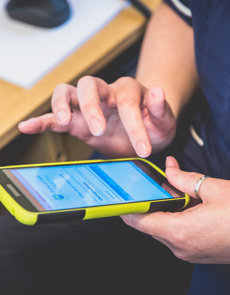What is a Medication Administration Record?
In any care setting, the importance of an accurate medication administration record (MAR) and how it is key to delivering high-quality care should never be overlooked. Accurate medication administration is vital for ensuring the safety and well-being of care recipients. However, managing medication records can be complex, especially when relying on traditional paper-based systems.
Here at The Access Group, we are committed to providing valuable insights and innovative software solutions to help care providers streamline their medication administration processes. With over 30 years of experience digitising health and social care services, we know exactly what providers need to succeed. Whether you’re managing a care home or providing domiciliary care, we’ll show you how modern electronic medication administration record (eMAR) solutions can help ensure safe, efficient and compliant medication administration.
Here, we will explore the significance of the medication administration record, the limitations of a traditional MAR chart and how eMAR software can transform your medication management in line with UK regulations.
What is a Medication Administration Record?
A MAR is a crucial document used by care providers to track the administration of medications to care recipients. The MAR chart records details such as the name of the medication, dosage, administration time, route of administration and the identity of the person administrating the medication. It serves as an essential tool for ensuring that medications are given correctly and safely, in line with prescribed instructions.
Across the UK, the use of MAR charts in care homes is standard practice. It’s also used in nursing homes and domiciliary care settings. They help care workers, nurses and other care professionals adhere to the rights of medication administration, which include the right person, right medication, right dose, right time, right route and right documentation. Proper adherence to these rights is crucial for minimising medication errors and ensuring the safety of individuals.

Traditional MAR Charts
Traditional MAR charts, usually paper-based, have been the cornerstone of medication management in care services for decades. They’re easy to use and require minimal training, making them accessible to all care staff. Additionally, they provide a simple, clear record that can be easily reviewed and audited.
However, despite their widespread use, traditional paper-based MAR charts have significant limitations that can impact the quality of care. These include:
- Human error – Paper MAR charts are prone to human error, including incorrect entries, illegible handwriting and accidental omissions. These mistakes can lead to medication errors, which may have severe consequences for patients.
- Difficulty in tracking and auditing – Paper-based MAR charts are cumbersome to manage, particularly in larger care settings. Tracking medication administration records over time or across multiple locations can be challenging, leading to potential gaps in information.
- Limited accessibility – MAR charts are often stored in a single location, making it difficult for multiple care workers to access the same information simultaneously. This limitation can slow down the medication administration process, especially in time-sensitive situations.
- Lack of integration – Traditional MAR charts do not integrate with other care systems, such as electronic health records (HER) or care planning software. This lack of integration can result in fragmented information, making it harder for care teams to have a full view of someone’s care.
Advantages of eMAR Systems

It can be difficult to know what method of medication administration is best. To address the challenges associated with traditional MAR charts, many care services in the UK are turning to electronic medication administration record systems. eMAR systems digitise the medication administration process, providing a more efficient, accurate and integrated solution for managing medications. Here are some more advantages of eMAR systems:
Accuracy and Error Reduction
One of the most significant benefits of eMAR systems is the reduction in medication errors. By digitising the medication administration process, eMAR systems eliminate many of the common errors associated with paper-based MAR charts, such as illegible handwriting, missed doses or incorrect medication entries. Alerts and reminders can also be set up within the eMAR system to notify care workers when medication is due, further reducing the risk of missed doses.
Real-Time Documentation
eMAR systems allow for real-time documentation of medication administration. This feature ensures that all records are up-to-date and accurate, providing a reliable source of information for care workers and healthcare professionals. Real-time documentation also facilitates quicker decision-making and better care coordination.
Improved Accessibility and Efficiency
Some eMAR systems can be accessed from multiple devices, such as tablets or smartphones, allowing care workers to update records and check medication details from any location within the service or even remotely in domiciliary care settings. This improved accessibility enhances the efficiency of the medication administration process and ensures that all care workers have access to the same up-to-date information.
Integration with Other Care Systems
eMAR systems can often be integrated with other digital care systems, such as care planning tools, to create a seamless flow of information across different aspects of an individual’s care, improving communication between care teams and reducing the risk of fragmented care.
Enhance Auditing and Reporting
eMAR systems provide robust auditing and reporting capabilities, making it easier to track and review medication administration records over time. Some systems flag if medication is missed automatically. Then reports can be generated to monitor medication adherence, identify trends and detect any potential issues before they become critical. This enhanced reporting supports better governance and compliance with regulatory requirements.
Support the Rights of Medication Administration
All eMAR systems are designed to support the rights of medication administration by providing prompts and checks that ensure each of the six rights is adhered to during the medication administration process. This feature is particularly beneficial in reducing the likelihood of errors and ensuring the safety of people.

MAR Charts in Care Homes
In care homes, where care recipients often have complex medication regimens, the use of MAR charts is essential for ensuring that all medications are administered correctly and on time. However, as we explored previously, the traditional paper-based MAR chart system can be awkward, particularly in larger care homes with many care recipients and multiple care staff.
Implementing an eMAR system in care homes can significantly improve the efficiency and accuracy of medication administration. With eMAR, care workers can quickly access up-to-date information on each resident’s medication needs, reducing the risk of errors and ensuring that all medications are given as prescribed. Additionally, the ability to generate detailed reports on medication administration helps care home managers monitor and make informed decisions about the care of individuals.

See our industry leading eMAR system: Access Medication Management
MAR Charts in Domiciliary Care
Domiciliary Care, also known as home care, presents unique challenges for medication administration. Care workers in domiciliary care settings often work alone, visiting multiple clients throughout the day. Maintaining accurate and consistent MAR charts can be challenging under these circumstances, particularly when using traditional paper-based systems.
eMAR systems offer significant advantages for domiciliary care providers. With eMAR, care workers can access and update medication administration records from their mobile devices, ensuring that all information is recorded in real-time. This capability is particularly beneficial in domiciliary care, where care workers may need to update records while on the move. Additionally, eMAR systems can provide reminders and alerts, helping care workers stay on top of their care recipients’ medication schedules and reducing the risk of missed doses.
Compliance with Laws and Regulations
In the UK, medication management in care settings is governed by various laws and regulations aimed at ensuring the safety and well-being of people in care. The CQC (Care Quality Commission) sets out standards for safe medication management in England, which include the accurate recording of medication administration and the proper training of care workers.
Traditional MAR charts, while widely used, can make it challenging to meet these standards consistently, particularly in larger care settings. On the other hand, eMAR systems offer a more reliable and efficient way to comply with regulatory requirements.
By reducing the risk of errors, improving documentation and providing robust auditing capabilities, eMAR systems support care providers in meeting the CQC’s standards and ensuring the safety of their care recipients.

Implement the Right eMAR System
The medication administration record is a critical tool in the safe and effective management of medications in health and social care settings. While traditional MAR charts have been the standard for many years and have their own benefits, unfortunately, they are not without their challenges, particularly in terms of accuracy, accessibility and integration with other care systems.
Electronic administration records are a great alternative that is often favoured by most providers. They offer a more efficient, accurate and integrated solution for managing medications. By adopting an eMAR system, care homes and domiciliary care providers can reduce the risk of medication errors, improve compliance with regulatory requirements and enhance the overall quality of care.
At The Access Group, our eMAR system has been designed to support residential care providers in delivering and maintaining the highest standards of medication management. Our eMAR solution is user-friendly, fully integrated with other care systems and compliant with UK laws and regulations. For those managing medications in domiciliary care, our Access Care Planning software can be used to improve the safety and efficiency of your medication administration process.
To learn more about how our eMAR solution can benefit your care service or to find out how to implement it, get in contact with us to get started or watch a demo today.


 AU & NZ
AU & NZ
 SG
SG
 MY
MY
 US
US
 IE
IE




